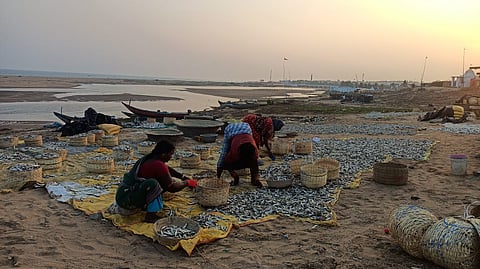
New Delhi- The Union Budget 2024, presented by the Finance Minister of India Nirmala Sitaraman on the 23rd of July, like previous budgets since 2014, have primarily reduced fisheries sector to aquaculture. Since the Neel Kranti Mission of 2016 (another renaming of 7th five year plan), there has been a concerted effort from the BJP led NDA government to shift fishing from capture to culture.
Marine and traditional fishers have been the worst affected due to this capital and profit driven push from the government. This budget like the ones before has only boosted fish culture and fish farming and cannot be claimed as a boost to fisheries sector.
Rs. 2,616.44 crore, allocation for the year 2024-25 for the Department of Fisheries (DoF), claiming that it is 54 percent higher than 1,701.00 crore FY2023-24.
Rs. 2,352 crores allocated for Pradhan Mantri Matsya Sampada Yojana (PMMSY) scheme. Further, it was claimed that this allocation is 56% more than the allocation of Rs. 1,500 crores made during the year 2023-24. With emphasis on 5 integrated aquaculture parks, increased aquaculture productivity, concessional finance support to private entrepreneurs and investors for setting up of shrimp aquaculture facilities
Customs Duty Reduction: Basic Customs Duty on essential inputs is reduced to 5%. To strengthen India's shrimp farming industry globally, import duty reductions on key inputs are proposed for lowering production costs and increase revenues & profit margins.
Basic Customs Duty (BCD) on shrimp broodstock (Litopenaeus vannamei and Black Tiger/ Penaeus monodon) will be reduced from 10% to 5%, on polychaete worms from 30% to 5% and on shrimp and fish feed from 15% to 5%. Further, various inputs like mineral and vitamin pre mixes, krill meal, fish lipid oil and crude fish oil, algal prime (flour) and algal oil, artemia and artemia cyst have been exempted from custom duties.
Nucleus Breeding Centres: Financial support for Shrimp broodstock breeding centres. To ensure availability of quality brood for quality seed, Finance Minister announced the financial support for setting up a network of Nucleus Breeding Centre (NBC) for shrimp brood stocks.
Shrimp Sector Financing: Easier funding through NABARD for shrimp farming, processing, and export.
The allocations of DoF will be largely be benefitted by the Transnational Seafood Exporters, Shrimp industrial farms Landlords and other aquaculture value and chain retailers and merchants. This allocation not only excludes the larger indigenous primitive capture fisher peoples (Marine and Inland), fish workers and other allied coastal communities of the peninsular India, but possess a danger to the Food sovereignty of India. This is reflected in the stock market with the shares of seafood and shrimp companies gaining significantly - Shares of Waterbase zoomed 20 percent to ₹102.18 apiece. Meanwhile, Apex Frozen Foods also surged 20 percent to ₹311.75 apiece, also its record high and Avanti Feeds rallied 14.3 percent to its new high of ₹737.55 apiece.
With almost the entirety of the fisheries allocation devoted to culture and farming, the Marine Wild shrimp capturing Kerala Fishers associations and unions are still awaiting the union government to get the ban lifted. Indian government continues to be complicit in the USA’s ban on wild marine shrimps, since 2019.
The indigenous fishing communities in India, have been facing serious crisis of loss of their homes both in the Ocean and coast due to the port led development projects, aqua and marine culture farms, climate crisis induced natural disasters, climate conversation projects preventing access, cyclone warnings preventing fishing and more.
All of these have severely affected the community's livelihood, food security, lives and traditional fishing grounds But none of these issues have been addressed by the budget or this government!
While India claims to be the champion of small scale fishers in the WTO forums, it has done nothing but destroy the lives of small, traditional, artisanal and subsistence fishers across India. From Fish being a cheap and protein rich diet, the Modi led govt has been pushing chemical and antibody induced farmed product replacements by destroying wild capture fisheries in India.
It is evident that the budget is in continuation of the process of capitalisation, profitisation of the Indian oceans and water bodies. Sadly, even in that the traditional small fishing communities have been totally excluded, being blindfolded into believing that culture fisheries is as good a replacement! On the other hand, there are no special climate justice allocations for the fishing community, one of the worst frontline affected communities due to the drastic impacts of climate crisis. The government has proved that fisher people are not a priority for them, but the multinational corporations and fish stock cartels are!
-Release as PAR India - a network for people centric action research on ocean, ocean peoples and climate concerns. It is part of the global PAR alliance.
You can also join our WhatsApp group to get premium and selected news of The Mooknayak on WhatsApp. Click here to join the WhatsApp group.